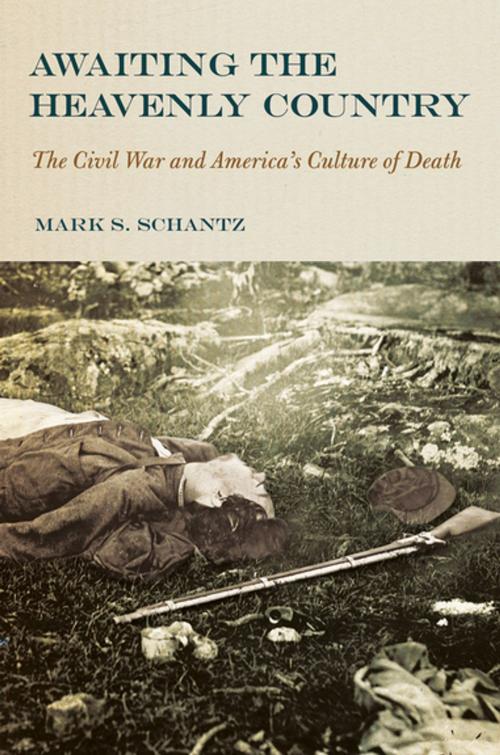Awaiting the Heavenly Country
The Civil War and America's Culture of Death
Nonfiction, History, Americas, United States, Civil War Period (1850-1877)| Author: | Mark S. Schantz | ISBN: | 9780801458019 |
| Publisher: | Cornell University Press | Publication: | December 15, 2009 |
| Imprint: | Cornell University Press | Language: | English |
| Author: | Mark S. Schantz |
| ISBN: | 9780801458019 |
| Publisher: | Cornell University Press |
| Publication: | December 15, 2009 |
| Imprint: | Cornell University Press |
| Language: | English |
"Americans came to fight the Civil War in the midst of a wider cultural world that sent them messages about death that made it easier to kill and to be killed. They understood that death awaited all who were born and prized the ability to face death with a spirit of calm resignation. They believed that a heavenly eternity of transcendent beauty awaited them beyond the grave. They knew that their heroic achievements would be cherished forever by posterity. They grasped that death itself might be seen as artistically fascinating and even beautiful."—from Awaiting the Heavenly Country
How much loss can a nation bear? An America in which 620,000 men die at each other's hands in a war at home is almost inconceivable to us now, yet in 1861 American mothers proudly watched their sons, husbands, and fathers go off to war, knowing they would likely be killed. Today, the death of a soldier in Iraq can become headline news; during the Civil War, sometimes families did not learn of their loved ones' deaths until long after the fact. Did antebellum Americans hold their lives so lightly, or was death so familiar to them that it did not bear avoiding?
In Awaiting the Heavenly Country, Mark S. Schantz argues that American attitudes and ideas about death helped facilitate the war's tremendous carnage. Asserting that nineteenth-century attitudes toward death were firmly in place before the war began rather than arising from a sense of resignation after the losses became apparent, Schantz has written a fascinating and chilling narrative of how a society understood death and reckoned the magnitude of destruction it was willing to tolerate.
Schantz addresses topics such as the pervasiveness of death in the culture of antebellum America; theological discourse and debate on the nature of heaven and the afterlife; the rural cemetery movement and the inheritance of the Greek revival; death as a major topic in American poetry; African American notions of death, slavery, and citizenship; and a treatment of the art of death—including memorial lithographs, postmortem photography and Rembrandt Peale's major exhibition painting The Court of Death. Awaiting the Heavenly Country is essential reading for anyone wanting a deeper understanding of the Civil War and the ways in which antebellum Americans comprehended death and the unimaginable bloodshed on the horizon.
"Americans came to fight the Civil War in the midst of a wider cultural world that sent them messages about death that made it easier to kill and to be killed. They understood that death awaited all who were born and prized the ability to face death with a spirit of calm resignation. They believed that a heavenly eternity of transcendent beauty awaited them beyond the grave. They knew that their heroic achievements would be cherished forever by posterity. They grasped that death itself might be seen as artistically fascinating and even beautiful."—from Awaiting the Heavenly Country
How much loss can a nation bear? An America in which 620,000 men die at each other's hands in a war at home is almost inconceivable to us now, yet in 1861 American mothers proudly watched their sons, husbands, and fathers go off to war, knowing they would likely be killed. Today, the death of a soldier in Iraq can become headline news; during the Civil War, sometimes families did not learn of their loved ones' deaths until long after the fact. Did antebellum Americans hold their lives so lightly, or was death so familiar to them that it did not bear avoiding?
In Awaiting the Heavenly Country, Mark S. Schantz argues that American attitudes and ideas about death helped facilitate the war's tremendous carnage. Asserting that nineteenth-century attitudes toward death were firmly in place before the war began rather than arising from a sense of resignation after the losses became apparent, Schantz has written a fascinating and chilling narrative of how a society understood death and reckoned the magnitude of destruction it was willing to tolerate.
Schantz addresses topics such as the pervasiveness of death in the culture of antebellum America; theological discourse and debate on the nature of heaven and the afterlife; the rural cemetery movement and the inheritance of the Greek revival; death as a major topic in American poetry; African American notions of death, slavery, and citizenship; and a treatment of the art of death—including memorial lithographs, postmortem photography and Rembrandt Peale's major exhibition painting The Court of Death. Awaiting the Heavenly Country is essential reading for anyone wanting a deeper understanding of the Civil War and the ways in which antebellum Americans comprehended death and the unimaginable bloodshed on the horizon.















